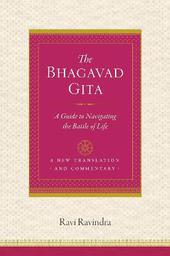
|
The Bhagavad Gita: A Guide to Navigating the Battle of Life
Paperback / softback
Main Details
| Title |
The Bhagavad Gita: A Guide to Navigating the Battle of Life
|
| Authors and Contributors |
By (author) Ravi Ravindra
|
| Physical Properties |
| Format:Paperback / softback | | Pages:320 | | Dimensions(mm): Height 228,Width 152 |
|
| Category/Genre | Religion and beliefs
Hindu sacred texts |
|---|
| ISBN/Barcode |
9781611804102
|
| Classifications | Dewey:294.5924047 |
|---|
| Audience | |
|---|
|
Publishing Details |
| Publisher |
Shambhala Publications Inc
|
| Imprint |
Shambhala Publications Inc
|
| Publication Date |
16 May 2017 |
| Publication Country |
United States
|
Description
A new translation of the great classic--with wide-ranging, multitraditional commentary that emphasizes its practical advice for living with integrity. The Bhagavad Gita is undeniably one of the world's greatest spiritual classics. A small section of the much larger epic Mahabharata, it takes the form of a dialogue between the warrior Arjuna and his charioteer, Krishna, an incarnation of the Hindu god Vishnu, on the meaning of life. It has often been understood as a key to understanding life by anyone, regardless of religious persuasion. This new translation and extensive commentary emphasizes the universality of the text by drawing on mulitcutlural and multireligious sources for understanding it. Not only Hindu sources, but Christian and Buddhist ones, as well as literary and mythological sources, and the Work of G. I. Gurdjieff.
Author Biography
RAVI RAVINDRA, PhD, is an international speaker and the author of books on religion, science, and spirituality. A Canadian of Indian birth, he is Professor Emeritus at Dalhousie University in Halifax, where he served for many years as a professor in Comparative Religion, Philosophy, and Physics. His spiritual search has immersed him in the teachings of Yoga, Gurdjieff, Krishnamurti, and Christianity, as well as interreligious dialogue and the relationship between science and spirituality. He is the author of numerous books, notably his translationPatanjali's Yoga Sutraswith commentary, his writings on Krishnamurti and the Gurdjieff Work, and his comparisons of Indian and Christian mysticism.
Reviews"A commentary on the Bhagavad Gita that is in a class of its own. The background story from the Mahabharata and its characters come alive. Almost no commentary on this ancient scripture emphasizes an historical battle but rather, all take pains to point to it as a metaphor for the battle within. However none so superbly take us within, to the very place of the battle raging within each one of us, as Ravi Ravindra's does. In so doing he truly makes come alive the promise of Krishna in Chapter Six that, 'Yoga is breaking the bond with suffering."-Swami Ambikananda Saraswati, Author, Founder of Traditional Yoga Association, UK "This engaging new rendition of one of the world's most venerated works opens up many of its dimensions that have usually been hidden. Ravindra's version brought me closer to the actual experience behind the meaning of the text than any other translations that I've read."-Richard Smoley, author of The Dice Game of Shiva: How Consciousness Creates the Universe. "Ravi Ravindra's translation of the Bhagavad Gita allows these sacred teachings to penetrate our hearts, open our minds and call us to action. His commentary on this classic text of yoga invites a sincere and practical engagement with the text and raises many questions for our lives. Ravindra's intimacy with the spiritual traditions of both the east and the west brings a rich and fertile look into the meaning of these teachings."-Kira Sloane, Director of Yoga Anytime "Ravindra's book speaks so splendidly (yes, with a radiant splendor) to the heart-mind of the student: he has surely listened so well to Krishna that the words fairly sing (after all, it is a "song") in one's being, touching both heart and mind! I particularly appreciated too the several footnotes that opened up the fullness of meaning of so many of the Sanskrit words in the original text. It is a work to be lived with, to be turned to again and again, as it speaks to the core of one's being."-Joy Mills, Former President of the Theosophical Society in America and Australia.
|